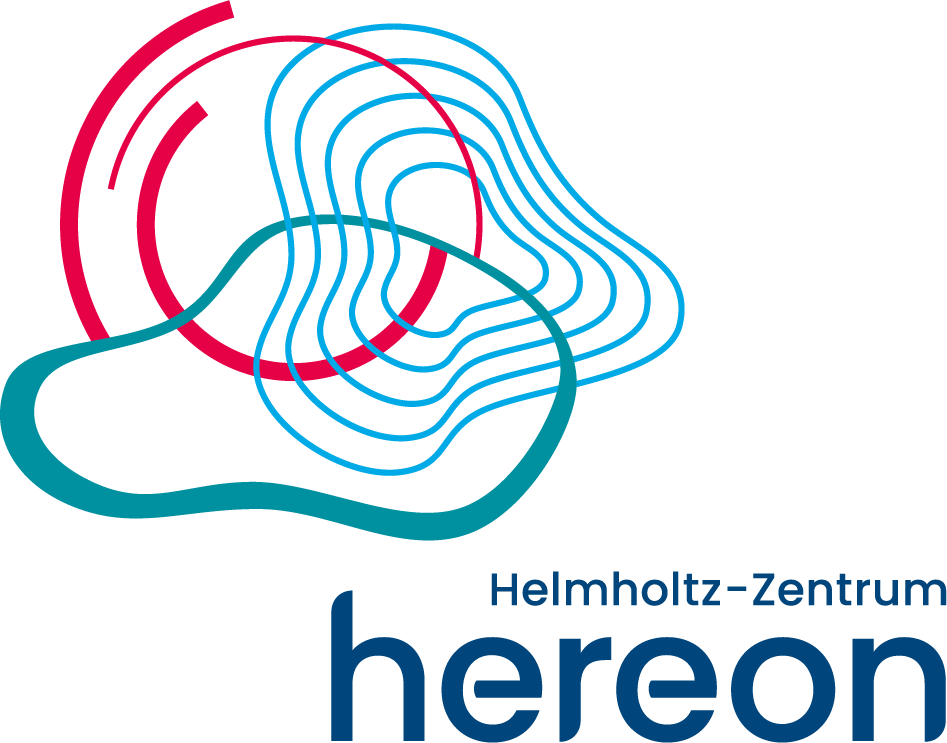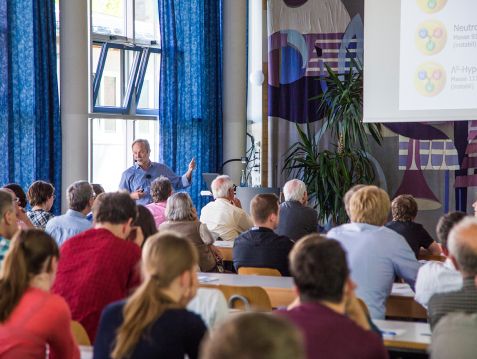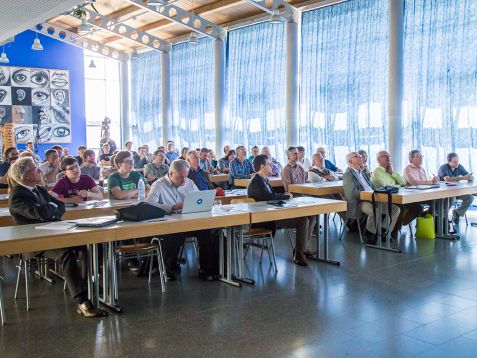MLZ is a cooperation between:
 > Technische Universität München
> Technische Universität München > Helmholtz-Zentrum Hereon
> Helmholtz-Zentrum Hereon
 > Forschungszentrum Jülich
> Forschungszentrum Jülich
MLZ is a member of:
 > LENS
> LENS > ERF-AISBL
> ERF-AISBL
MLZ on social media:

MLZ (eng)
Lichtenbergstr.1
85748 Garching
22.05.2018
Physics in Zwiesel: 42nd Edgar-Lüscher Seminar

Prof. Dr. Peter Senger, GSI Helmholtz Centre for Heavy Ion Research in Darmstadt explained the advantages of the ion accelerator FAIR under construction. © Stephan Loibl
To solve unexplained physical riddles of our time scientists perform great efforts. Ever more powerful machines promise deeper insights.
The participants in this year’s Edgar Lüscher Seminar at the Gymnasium Zwiesel, Bavarian Forest, got an update of pioneering research work. The scientific heads of the seminar, Prof. Dr. Winfried Petry and Prof. Dr. Peter Müller-Buschbaum from the Technical University of Munich (TUM), had invited renowned speakers to give talks to the teachers in the school in Zwiesel.
On site, the organization team around the school director Heribert Strunz and the physics teacher Claus Starke proved as excellent hosts of this traditional seminar for approximately 100 teachers from all over Bavaria.
“We want to explore the secrets of the nature”, said Dr. Andreas Kratzer from TUM School of Education in the opening lecture, for the first time offered especially for science interested students from Grafenau, Straubing, Viechtach and Zwiesel.
Prof. Dr. Peter Senger from the GSI Helmholtz Centre for Heavy Ion Research in Darmstadt explained the huge potential of the accelerator facility under construction FAIR. At FAIR, ion beams in previously unattained intensity and quality will be created and offer unprecedented insight into the structure of matter and development of the universe.
New large research facilities were also featured by Prof. Dr. Andreas Meyer from the Institute of Materials Science from the German Aerospace Center in Cologne. He explained the scientific benefit of experiments in the weightlessness for the (further) development of terrestrial measuring methods.
More interesting details from material research were presented by Prof. Dr. Stephan Roth from the Royal Institute of Technology in Stockholm, Sweden. He showed, how the accelerator PETRA IV at DESY in Hamburg soon could visualize processes inside a catalyst, a battery or a microchip under realistic conditions.

The participants of the 42nd Edgar Lüscher Seminar are listening with interest to the talks around the topic „Big instruments for big questions“ at the school in Zwiesel. © Stephan Loibl
New, direct insights into physical, chemical and biological processes of our everyday life are expected from the X-ray laser SwissFEL at the Paul Scherrer Institute in Villigen, Switzerland, which is planned to operate in 2019. Project manager Dr. Rafael Abela lectured about how his team is trying to determine the detailed structure of vital proteins in order to design new drugs.
Prof. Dr. Andreas Schreyer, director of the European Spallation Neutron Source under construction in Lund, Sweden reported on the world of neutrons. From 2023 on, the ESS will offer new possibilities in the area of material and bioscience.
Prof. Dr. Winfried Petry, now retired director of the research neutron source Heinz Maier-Leibnitz and the MLZ, explained, how neutrons can help to develop better batteries, antibiotics and computers with more storage capacity as well as ensure the supply of electricity in Bavaria.
One of the highlights was also the talk from Dr. Michael Hauschild from the European Organization for Nuclear Research CERN. He had personally witnessed the exploration of the Higgs particle in 2012.
Finally, Dr. Christian Fruck from the projects IceCube and MAGIC at Technical University of Munich talked about neutrino and gamma radiation to understand processes in the universe.
The next Lüscher seminar in Zwiesel is already planned for 22 to 24 March 2019 with the topic „Renewable energies“.
German Text: Thomas Kufner /Gymnasium Zwiesel
MLZ is a cooperation between:
 > Technische Universität München
> Technische Universität München > Helmholtz-Zentrum Hereon
> Helmholtz-Zentrum Hereon
 > Forschungszentrum Jülich
> Forschungszentrum Jülich
MLZ is a member of:
 > LENS
> LENS > ERF-AISBL
> ERF-AISBL
MLZ on social media:


